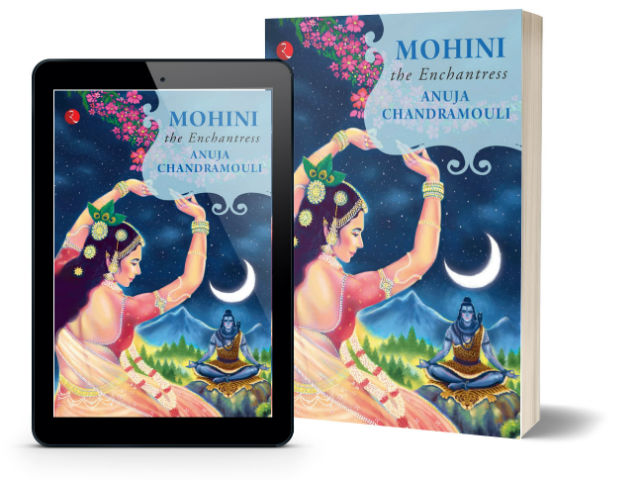We are always curious to explore works of various Indian authors and Anuja Chandramouli is one of them. She made an impressive debut with – Arjuna: The Warrior Prince and then she didn’t look back. We have already reviewed some of her books, here are quick links for the same.
- Kartikeya: The Destroyer’s Son
- Rani Padmavati – The Burning Queen
- Prithviraj Chauhan: The Emperor of Hearts
- Ganga: The Constant Goddess
- Muhammad Bin Tughlaq: Tale of a Tyrant
Today, we are going to talk about her latest book, Mohini: The Enchantress.
| Book Title | : | Mohini: The Enchantress |
| Author | : | Anuja Chandramouli |
| Publisher | : | Rupa Publications India (10 Aug 2020) |
| # of Pages | : |
3351 KB; 221 (Kindle Ebook) 240 (Paperback) |
| # of Chapters | : | 19 |
| Purchase Link(s) | : |
Like the other works by Anuja Chandramouli, we read this book with enthusiasm and here are my thoughts on it on behalf of Team Thinkerviews.
This Is Here In For You
Book Cover:
Despite strongly believing in the idiom, “a book should not be judged by its cover”, we also acknowledge the influence of a well-designed and attractive cover page in many book purchase and/or reading decisions.

Mohini: The Enchantress By Anuja Chandramouli | Book Cover
The cover page of this book, as you can see, is really designed well. The shades of blue used for the background looks really good. It also conveys the vastness of the story and its canvas. You can also see Lord Shiva in his typical pose and the moon hovering over him. In the front, you can see the enchantress in one of her dance poses. Overall, an interesting cover page which remains true to the story explored within.
Storyline:
This book is a reimagining of Indian mythological tales and you can many tales (with a link) weaved together here.
The canvas of the story is quite widespread. It explores incidents from the births of Devas and Asuras to the famous Samudra-Manthan (Ocean-churning) to Mahabharata to the time after that.
If you are aware of the tale of Mohini, you might already know that she is an incarnation of Lord Vishnu. We found the reference of her appearance when “Amrit” – the nectar of immortality appeared as the result of ocean-churning. She was the one who enwitched the devas and the asuras and eventually was able to deliver it to the recipients pre-decided.
The tale explored by Anuja is far longer than this and even explores different aspects. Sometimes you find monologues by Mohini, telling her own tale, sometimes it switches to the narration of the incidents by the author.
In fact, the author herself says:
I am Mohini. And this is my story. But if you are looking for a simple old story with a beginning, middle and end, you are going to be disappointed. That is not entirely true, because no matter what I do, even if I get distracted …
Let us not explore the story in depth to avoid spoilers, but, let me share my views for the book and its writing. Of course, there might be some spoilers that are unavoidable, so read with consent.
Indian, is the most open-minded civilization where you are allowed to re-imagine its holiest tales, without feeling fearful or even regretful.
While the author mixes many timelines and fantasy fictions in her book, her aim is not to deteriorate the original tale, but to explore “Mohini” beyond her unmatched physical beauty. Sometimes, the stories become so popular and the elaborated side of the persona of the character becomes his/her long-lasting impression. More often readers don’t imagine the other aspects of the characters. And, with such an attitude, they eventually develop prejudice for them (the characters).
So yes, if you consider Mohini’s tale a holy or religious stuff and want to stick to the traditional widespread popular version of it, you should avoid this book.
In order to connect the readers of today, the author added many scenes that reflect current times. You can also find some characters in the book chopping onions and potatoes.
In the beginning of the book, when the author talks (via media – a character) that mostly the tale is explored by male narrators, and that is/could be the reason why Mohini is not explored beyond her ethereal beauty, you may start thinking that the book will have some “feminism” related lectures. Of course, strong female characters is part of Indian mythology and thus this book too. But, towards the end of the book, the author also explores the part where female characters and the damage done by them to their male counterparts. So, if you are an open-minded reader, you will understand that the book doesn’t consider any sex weaker or better. It is all about their inter-dependability and union. Without one, the other is incomplete.
The book raises many logical questions and makes the reader to think, not just only read. For example, there comes a place where the author raises the fact that Sukra (Shukracharya) got the knowledge of Sanjeevani from Lord Shiva. Now, as Lord Shiva knew it, why hadn’t he used it for his own benefit when Shakti (one of her incarnations actually) left her mortal body? Well, that is the main point to understand from the mythology- possessing power doesn’t mean you can use it anytime anywhere. And, mostly, you will never come to find an incident when Gods – especially the holy trinity – have used it for their own personal benefit.
So, yes if you love to read between the lines and unwritten words, this book is a good option.
In terms of language, the author has a fantastic grip on English and her writing contains some fantastic words and wordplays. Some readers will find it difficult and sometimes too much ornamented. Simple language could have made the book more enjoyable.
For example:
“Mohini is incapable of love…” Shakti had informed her old friend.
“How is that a bad thing? She will forever be free from the bondage and tyrannies of the said emotion, the vulnerability and revolting mess that infinite tenderness leaves in its wake as well as the degradation that complete surrender demands”. Vishnu was unperturbed.
While these lines explore a different perspective to look at an emotion, as you can see, one needs to have a better vocabulary to understand it. You will surely enjoy it otherwise.
Here are a few more lines from the book that I found written interestingly.
The ocean was a tricky customer full of distractions and sought repeatedly to drive them off course even as they struggled to relieve the water body of its valuables.
—- —- —- —- —-
It was perilous, for this entire enterprise had been set afloat by the power of conviction, belief in the impossible and the purported ability of the mid to prevail over matter.
—- —- —- —- —-
Magic cannot last forever and must make way for the mundane. Powerful rishis will be replaced by shabby aspirants and tricksters more adept at peddling worthless trifles than purveying universal truths.
The fonts of the book could have been a little bigger.
Summary:
Overall, a book with high-quality linguistics with mixed timelines and not-so-easy language, for open-minded readers.
Around 7 out of 10.
Quick Purchase Links:
- Buy – Mohini: The Enchantress By Anuja Chandramouli -Paperback
- Buy – Mohini: The Enchantress By Anuja Chandramouli -Kindle EBook
- Buy – Mohini: The Enchantress By Anuja Chandramouli -Paperback
- Buy – Mohini: The Enchantress By Anuja Chandramouli -Kindle EBook
Over To You:
If you already have read the book do share your remarks and thoughts via comments below. Does this review help you in making your decision to buy or read the book? Do not forget to share this article with your friends over various social networks via Twitter, Facebook and others. And yes, you may like to subscribe to our RSS feeds and follow us on various Social networks to get latest updates for the site to land right in your mail box.
 ThinkerViews – Views And Reviews Personal views and reviews for books, magazines, tv serials, movies, websites, technical stuff and more.
ThinkerViews – Views And Reviews Personal views and reviews for books, magazines, tv serials, movies, websites, technical stuff and more.



